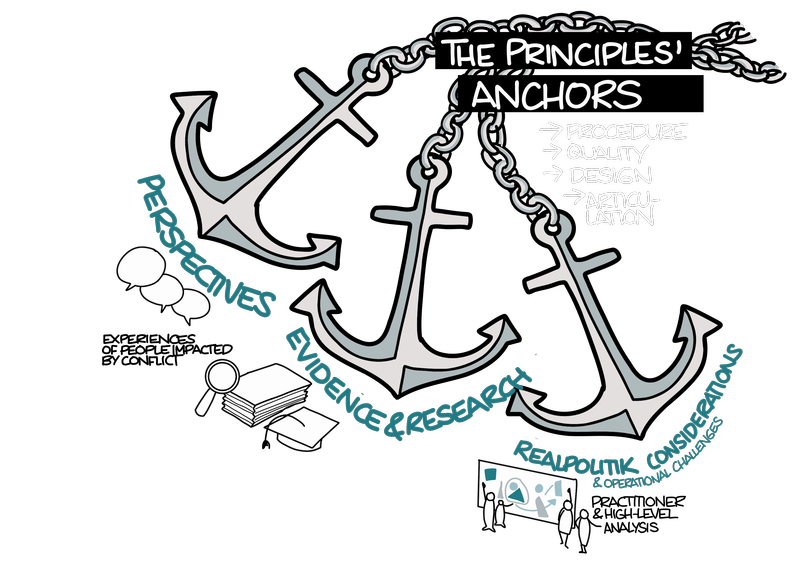COLLABORATING FOR SHARED VISION
Developing the Principles for Peace
The Principles for Peace initiative was led by the International Commission on Inclusive Peace and an independent secretariat hosted at Interpeace. (This independent secretariat later became formalised in 2023 as the Principles for Peace Foundation—P4P, who we are today!) The members represented a geographic balance and diversity in experiences.
The two-year development process engaged thousands of stakeholders in more than 60 countries, involving 150 consultations and analysis of over 700 case studies. It brought together a broad coalition of actors – across political, diplomatic, academic, defence and security, civil society, and multilateral organisations—for a deeply iterative process.
It was supported by 120 partner organisations and a research committee, made up of prominent
experts from leading academic institutions and think-tanks, who acted as a sounding board and peer review body throughout the process and helped to ensure the Principles are grounded in evidence.
The two-year development of the Principles involved extensive consultations with diverse stakeholders—including civil society, youth and women peacebuilders, parliamentarians, non-state armed groups, and citizens affected by conflict. This approach was shaped by complementary data collection methods, combining cutting-edge research, expert analysis, and extensive local inputs that conveyed lived experiences of conflict and peacemaking from around the world.

The development of the Principles for Peace happened in three distinct phases.
phase 1
The process began with a thorough evidence mapping exercise conducted to identify shortcomings in the current peacebuilding ecosystem. This included the systematic review of scholarly and practitioner literature, as well as in-depth case studies of past peace processes and a series of consultations in 12 countries. The aim was to gain a comprehensive understanding of the peace ecosystem and identify key challenges and practical dilemmas in the field.
phase 2
the initial thematic exploration unfolded, specific proposals and emerging concepts started to emerge. The Secretariat (P4P) and the International Commission systematically reviewed and synthesised these ideas, grouping similar concepts for further discussion and validation. Further iterative consultations were held with different stakeholders to test the feasibility and political relevance of the emerging concepts. This phase involved parallel working groups led by members of the ICIP and included expert representatives from relevant research and practitioner organisations. The collaborative working group process facilitated dialogues between different actors, ensuring inclusivity and validation of the articulated Principles. By the end of Phase 2, a set of Principles had been drafted.
phase 3
This phase the focus shifted to further consolidating the Principles and subjecting them to extensive review and feedback. This involved regional feedback and validation sessions, engagement with specific communities of practice, and considerations regarding incentives, accountability, and producing change in the international system. These activities aimed to explore how different actors at the international, national, and subnational levels could effectively utilise the Principles for maximum impact.
Overall, the participatory nature of the process — involving diverse actors and extensive consultations — resulted in a comprehensive and inclusive framework for achieving lasting peace. It effectively bridges the gap between realpolitik and real society, leveraging cutting-edge research, participatory consultations, and public engagement to reshape peace processes on a global scale.